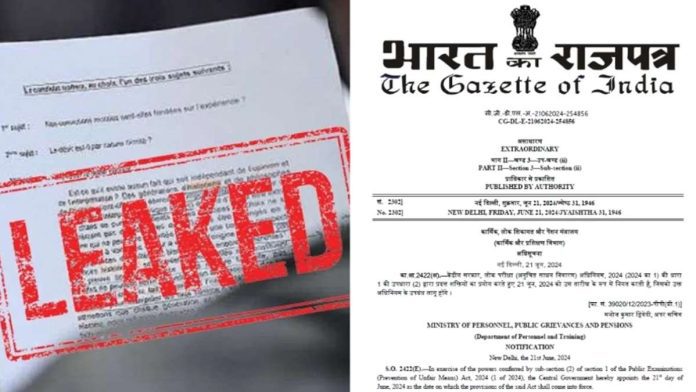Paper Leak Law, Public Examinations Act: The incidents of paper leak are now expected to be completely stopped. Strict provisions for punishment have been made in the Public Examination Act.
Paper Leak Law: There is a ruckus across the country regarding the NEET paper leak and then the cancellation of the UGC-NET exam. Meanwhile, the government has taken a big decision and implemented a strict law to stop paper leaks. The Central Government has notified the ‘Public Examinations (Prevention of Unfair Means) Act, 2024’. The purpose of this anti-paper leak law is to prevent paper leaks and cheating in competitive examinations.
The Central Government has implemented the law passed in February this year from Saturday (June 22). Under this Act, there is a provision of maximum 10 years imprisonment and a fine of up to Rs 1 crore for the offenders. The Public Examinations Act has been implemented when Union Education Minister Dharmendra Pradhan was questioned about when it would be implemented. The Education Minister had said that the ministry is making rules.
If you do these 15 things, you will be punished
15 activities have been identified in the Public Examination Act 2024. Involvement in any of these can result in punishment up to imprisonment or ban. Information about these 15 activities is given below.
- Leaking the question paper or answer key before the examination.
- If you are involved with other people in the answer key or paper leak.
- If you see or keep the question paper or OMR sheet without any authority.
- If any unauthorized person tells the answers of one or more questions during the examination.
- If a candidate is helped to write the answer in any examination in any way, directly or indirectly.
- In case of tampering with the answer sheet or OMR sheet.
- If any manipulation is done in the assessment without any authority or without bonafide error.
- In case of deliberately ignoring or violating the standards and rules prescribed by the Central Government for any examination.
- Tampering with any document which is considered necessary for shortlisting a candidate or determining his merit or rank.
- Intentionally violating security standards with the intention of causing disturbance in the conduct of the examination.
- Tampering with computer network, computer resource or any computer system is also included in this.
- Tampering with the seating arrangement of the candidate, exam date or allocation of shift with the intention of cheating in the examination.
- Threatening people related to the Public Examination Authority, Service Provider or any government agency or causing disruption in any examination.
- Creating fake websites to extort money or commit fraud.
- There can also be punishment for conducting fake examinations, issuing fake admit cards or offer letters.
The main objective of this law is to stop the use of unfair means in examinations. The law also provides for punishment of 3 to 10 years and a minimum fine of Rs 1 crore to the accused.


